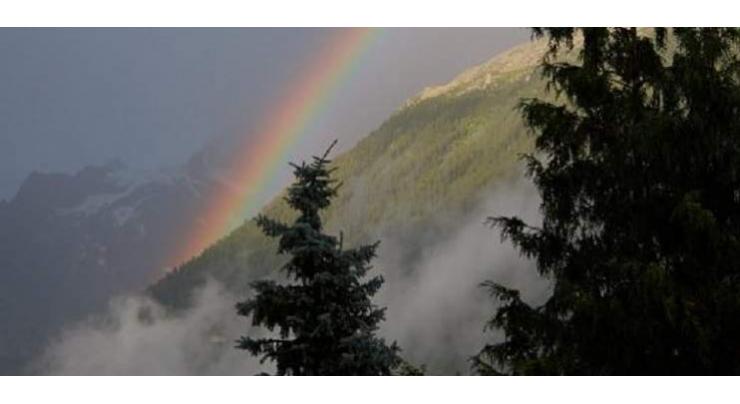
MoCC Red Data Survey Continues Despite PSDP Cut Of 80 Percent In Funds
Fahad Shabbir (@FahadShabbir) Published October 22, 2020 | 01:41 PM

The Ministry of Climate Change has maintained the country's first National Red Data Book survey of mammals under Ten Billion Tree Tsunami project (phase-I) despite major cut in PSDP releases of 80 percent in funds being provided under the project amid COVID-19 pandemic
ISLAMABAD, (UrduPoint / Pakistan Point News - 22nd Oct, 2020 ) :The Ministry of Climate Change has maintained the country's first National Red Data Book survey of mammals under Ten billion Tree Tsunami project (phase-I) despite major cut in PSDP releases of 80 percent in funds being provided under the project amid COVID-19 pandemic.
Project Director TBTT Joint Secretary MoCC Suleman Khan Warraich told APP on Thursday that there was no such credible data available related to mammals and other native wildlife species for informed decision making.
"All the policies formed earlier have been developed superfluously based on estimated data of mammals. Due to Prime Minister Imran Khan's keen interest in biodiversity and ecosystem conservation the ministry has taken an initiative to develop first ever National Red Data Book on Mammals of Pakistan based on population estimates, under the umbrella of Ten Billion Tree Tsunami Programme, Phase-I." He added that the Red data book was the publication of risk assessment of species in every country across the globe. "It provides complete information of rare and endangered species and about their habitats. Pakistan; for the first time is going to make a comprehensive National Red Data Book of mammals, which will provide population status of species at national level. It will assist to devise monitoring and conservation strategies for threatened species at regional level." Warraich said a 45-member team comprising of MoCC, Zoological Survey of Pakistan, Punjab Wildlife and Parks Department, local universities' interns, media interns and international organisations namely IUCN and WWF was formed to conduct survey of Punjab Urial (Ovis vignei punjabensis).
He added that the prior governments had neglected such survey which hampered the way of informed decision making and therefore, this initiative would help in assessing the outcome of earlier policies particularly that of trophy hunting aimed at reviving the dwindling number of endangered species.
The Survey, he said started from October 10 and would conclude at October 25 where the teams would return consequently to tabulate the data.
The survey was being carried in the five districts of Punjab including Jhelum, Chakwal, Attock, Mianwali and Khushab.
The TBTT project director noted that transparency and international standardisation was ensured through double observer method to estimate the population of Punjab Urial.
"It will also help to suggest new protected areas or to increase the areas of existing protected areas for the conservation of Punjab Urial." He said under the Red Data Book, survey of Markhor, Ibex and Blue Sheep in Gilgit Baltistan, Ibex and Blanford Urial in Sindh, Suleman Markhor, Afghan Urial and Ibex in Balochistan and Kashmiri Markhor, Grey Goral in Khyber Pakhtunkhwa would be carried out.
"The survey will be kicked off during rutting as the one prevailing in Punjab for Urial." Besides, reduced financial allocations due to COVID-19 pandemic, the Ministry had managed to sustain the momentum of TBTT and National Red Data Book survey and had also acquired vehicles needed by the staff to hold survey.
/395
Related Topics
Recent Stories

Azam Khan likely to miss T20I series against Kiwis due to discomfort in right kn ..

Badar Shahbaz Warraich appointed as PM’s media coordinator

Finance Minister rules out rupee devaluation in talks with IMF

National team determined for good performance against New Zealand: Babar Azam

Currency Rate In Pakistan - Dollar, Euro, Pound, Riyal Rates On 18 April 2024

Today Gold Rate in Pakistan 18 April 2024

Saka and Odegaard start for Arsenal, Guerreiro in Bayern midfield

Qatar PM says re-evaluating Israel-Hamas mediation role

Govt spokesperson terms allegations of PTI's Marwat against Saudi Arabia 'heinou ..

Minister appreciate UAE’s support for Pakistan economic challenges

Manchester City v Real Madrid Champions League starting line-ups

MIGA's support Pakistan in attracting foreign investments: Federal Minister for ..
More Stories From Pakistan
-
CCPO reviews by-elections, security arrangements for Pak-New Zealand cricket matches
9 minutes ago -
South Punjab, PILDAT launch ‘Hum Ahang’ project to improve governance
19 minutes ago -
Commissioner for stern action against dengue larvae
28 minutes ago -
Dry & Cloudy weather forecasts for Sukkur
28 minutes ago -
KPRA to adopt fixed tax for wedding halls, beauty parlors
28 minutes ago -
IT minister ensures provision of conducive environment for IT sector
28 minutes ago
-
Romina for climate diplomacy to address environmental degradation challenges
28 minutes ago -
Police foils smuggling attempt of non-custom paid products
29 minutes ago -
Gas leak claims life in Quetta
39 minutes ago -
DC directs to expedite development projects in Matiari district
39 minutes ago -
Rangers arrest four involved in robberies
48 minutes ago -
Fly Jinnah launches another non stop flights from Islamabad-Muscat
48 minutes ago